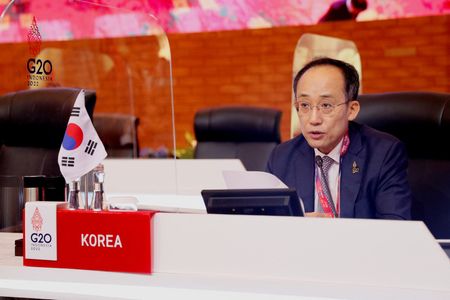By Choonsik Yoo
SEOUL (Reuters) – South Korea on Monday flagged a deeper economic slowdown than expected at least through the first half of next year, and extended sales tax breaks on some fuel oil products and passenger cars by a few months.
“Our economy’s growth is expected to slow next year due to the effects from a global economic slump, and the difficulty will be focused on the first half,” Finance Minister Choo Kyung-ho said at a meeting with the ruling party leadership, adding the economy was slowing at a more rapid pace than expected.
The government is expected later this week to announce its economic policy strategies for next year, which will be the first full-year statement for President Yoon Suk-yeol’s administration since its launch in May.
South Korea’s economy, the fourth-largest in Asia, relies heavily on exports ranging from cars and ships to chips and smartphones. It is widely expected to see growth fall below 2% next year from close to 3% this year.
The central bank last month cut its projection for next year’s economic growth to 1.7% from the previous 2.1% in its scheduled revision, citing falling exports and the resultant reduction likely in corporate investment.
As the economy has now to rely more on domestic consumption to offset cooling export demand, the finance ministry has extended by as much as six months tax breaks on fuel oil products and passenger car sales beyond their original end-2022 expiry.
The ministry is due to unveil its 2023 economic projections and strategies on Wednesday.
President Yoon, struggling against low approval ratings, says exports are the best choice for the manufacturing-heavy country to overcome its slump.
A problem is that China, South Korea’s top export market, is facing its own problems as its economy feels the impact of years of strict controls to fight COVID-19.
(Reporting by Choonsik Yoo; editing by Diane Craft and Stephen Coates)

